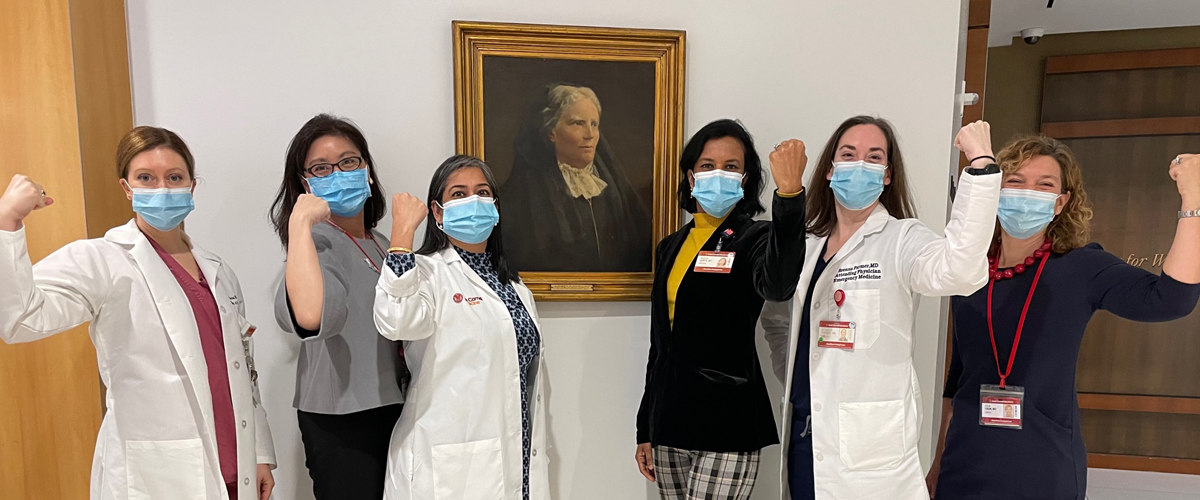Celebrating Dr. Elizabeth Blackwell at the Hospital That Grew From Her Efforts
In honor of National Women Physicians Day, a portrait of the first woman to become an M.D. in the United States is unveiled at NewYork-Presbyterian Lower Manhattan Hospital.

Physicians at the portrait of Dr. Elizabeth Blackwell at NewYork-Presbyterian Lower Manhattan Hospital. From left: Drs. Marisa McSwain, Judy Tung, Harjot K. Singh, Renuka Gupta, Brenna Farmer, and Julia Cron.
To celebrate National Women Physicians Day, NewYork-Presbyterian Lower Manhattan Hospital unveiled a portrait of Dr. Elizabeth Blackwell in the lobby on February 3, which is also Dr. Blackwell’s birthday.
The nation’s first woman doctor, Dr. Blackwell has strong ties to the hospital. In 1857, she founded the first U.S. hospital staffed entirely by women, the New York Infirmary for Indigent Women and Children, which evolved into today’s NewYork-Presbyterian Lower Manhattan Hospital. In 1868, she launched a medical college devoted entirely to the medical education of women, which was absorbed by what is today Weill Cornell Medicine.
Women physicians from NewYork-Presbyterian, who also serve as faculty at Weill Cornell Medicine, say the portrait’s prominent display is a source of pride and inspiration.
“I stand with my head held high, honored and privileged to be working in the same place founded by Dr. Elizabeth Blackwell,” says Dr. Renuka Gupta, chief of medicine at NewYork-Presbyterian Lower Manhattan Hospital and an associate professor of clinical medicine at Weill Cornell Medicine. “Having her portrait here reminds me every day to follow my dreams and passion.”
Dr. Gupta, who like Dr. Blackwell immigrated to the United States and pursued a career in medicine, says she can relate to the challenges that Dr. Blackwell faced at every turn. “Ignited by Dr. Blackwell,” who worked tirelessly to help other women succeed in medicine, Dr. Gupta formed a group last year called Women in Healthcare at NewYork-Presbyterian Lower Manhattan Hospital “to support one another and learn from each other’s journey.”
In addition, several women physicians launched the Blackwell Society in 2020 to support women at NewYork-Presbyterian and Weill Cornell Medicine and carry forward Dr. Blackwell’s legacy.
Having her portrait here reminds me every day to follow my dreams and passion.
Dr. Renuka Gupta
“The installation of this beautiful, historic portrait of Dr. Elizabeth Blackwell is meaningful to me on so many levels,” says Dr. Judy Tung, a member of the Blackwell Society’s steering committee, section chief of Adult Internal Medicine at NewYork-Presbyterian/Weill Cornell Medical Center and associate dean for Faculty Development at Weill Cornell Medicine. “It honors our hospital’s roots and connection to Dr. Blackwell. It uplifts women physicians striving towards advancement. And it’s a reminder of her legacy, to provide accessible care to all populations.”
Dr. Blackwell’s infirmary provided free healthcare to those who couldn’t afford its low fee. Caring for everyone, regardless of their ability to pay, resonates with emergency department physician Dr. Brenna Farmer.
Dr. Blackwell and her sister Dr. Emily Blackwell, who worked side by side, “were known for providing care to the disenfranchised, indigent, and those who society looked down on,” says Dr. Farmer, Emergency Department site director at NewYork-Presbyterian Lower Manhattan Hospital and associate professor of clinical emergency medicine at Weill Cornell Medicine. “Dr. Blackwell was their safety net. I’m most proud of providing care to everyone coming through the doors of the safety net of our health system, the Emergency Department.”
When Dr. Julia Cron joined NewYork-Presbyterian Lower Manhattan Hospital as chief of the Department of Obstetrics and Gynecology in 2021, her mother reminded her of Dr. Cron’s namesake – her great-great-aunt, Sister Julia Hayden, a member of the Little Sisters of the Poor, who, like Dr. Blackwell, dedicated her life to caring for the underserved in Lower Manhattan. “I am honored and humbled to follow in the paths of these women and the many other women who have dedicated their lives to caring for those in need,” says Dr. Cron, also an assistant professor of clinical obstetrics and gynecology at Weill Cornell Medicine. “And as an OB-GYN, I am proud to have dedicated my career to improving the lives of women and their families.”
It’s a reminder of her legacy, to provide accessible care to all populations.
Dr. Judy Tung
One of Dr. Harjot K. Singh’s favorite books as a child was about Dr. Blackwell. “I dreamed of following in her footsteps,” says Dr. Singh, site director of Infectious Diseases and an associate professor of clinical medicine at Weill Cornell Medicine. But at NewYork-Presbyterian Lower Manhattan Hospital, “I realized I was literally following in her footsteps. In celebrating her birthday, we honor the path she created by striving for opportunities for female physicians.”
Dr. Marisa McSwain, site chief for the Department of Anesthesiology and assistant professor of anesthesiology at Weill Cornell Medicine, says she feels empowered by the portrait.
“Dr. Blackwell found a path to medicine despite barriers that deterred many before her,” says Dr. McSwain. “When I see her portrait, I am inspired to find opportunities in obstacles and acknowledge the great privilege of my profession as a physician.”
In addition to the oil painting, NewYork-Presbyterian Lower Manhattan Hospital is home to a street corner named “Dr. Elizabeth Blackwell Place,” hallway murals depicting Dr. Blackwell’s infirmary, and artifacts such as her writing desk.
Juan Mejia, senior vice president and chief operating officer at NewYork-Presbyterian Lower Manhattan Hospital, says the portrait speaks to how Dr. Blackwell’s legacy lives on at the hospital and beyond.
“We hope that this portrait inspires people to follow in her footsteps through her commitment to diversity, service, mentorship, and leadership,” he says.
